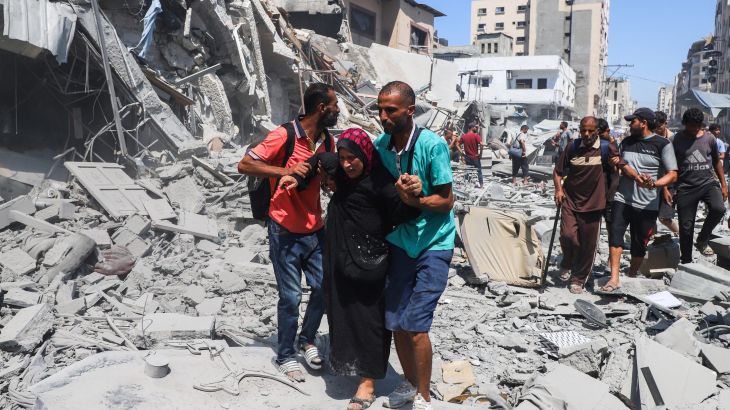# Rubio’s Israel Visit Amidst Gaza Conflict: US-Qatar Relations & International Condemnation
The recent Israeli airstrike in Qatar targeting Hamas leaders has sent shockwaves through the international community, prompting a flurry of diplomatic activity and strong condemnations. US Secretary of State Marco Rubio’s visit to Israel, followed by a planned trip to Qatar and the UK, underscores the complexities and sensitivities surrounding this escalating crisis. What exactly happened, and what are the wider implications?
## The Israeli Airstrike in Doha and its Aftermath
The Israeli airstrike in Doha, targeting Hamas leaders, has drawn sharp criticism from Qatar and other Arab nations. The timing of the strike, occurring amidst the ongoing conflict in Gaza and a significant hostage situation, further inflamed already tense regional relations. President Trump, while acknowledging the need to address Hamas, urged caution, highlighting Qatar’s role as a key US ally. This delicate balancing act reflects the intricate web of alliances and interests at play in the region.
The Israeli government, however, defended the strike, asserting that the targeted individuals were responsible for the October 7th terrorist attack that resulted in the deaths of over 1,200 people and the abduction of 251 hostages. They maintain the strike was a necessary measure to eliminate key figures within Hamas’s leadership.
But was the strike truly effective? Hamas claims only five of its members were killed, suggesting the intended targets – senior members of the group’s political negotiating team – escaped. This raises questions about the planning and execution of the operation and its overall impact on the conflict’s trajectory. Isn’t it crucial to evaluate the effectiveness of such operations considering their far-reaching consequences?
### The International Condemnation and Diplomatic Fallout
Qatar, a significant US ally and host to the largest American military base in the Middle East, Al-Udeid Air Base, vehemently condemned the Israeli strike. Qatar’s Prime Minister Sheikh Mohammed bin Abdulrahman al-Thani called for the international community to condemn Israel’s actions, highlighting what he perceives as double standards in the international response to the conflict. This strong condemnation underscores the potential strain on the US-Qatar relationship, despite their long-standing military alliance. Will this affect US military operations in Qatar?

An emergency Arab and Muslim leaders’ summit in Doha further amplified the international condemnation. A draft resolution emerged, condemning Israel’s actions in Gaza, including accusations of genocide, ethnic cleansing, and starvation. The resolution also called for international sanctions against Israel, including a weapons embargo and a review of diplomatic and economic relations. This forceful response reflects the growing international pressure on Israel to alter its approach in Gaza.
Israel, however, vehemently denies these accusations, arguing its military actions are solely targeted at Hamas militants and that it is Hamas that utilizes civilians as human shields. This stark disagreement highlights the fundamental differences in perspectives surrounding the conflict and makes finding a peaceful resolution extremely difficult. Can these conflicting narratives ever be reconciled?
## Rubio’s Diplomatic Mission: Navigating the Complexities
Secretary Rubio’s visit to Israel, followed by his planned trip to Qatar and the UK, places him at the heart of this diplomatic maelstrom. His meetings with Prime Minister Netanyahu aimed to gain a better understanding of Israel’s plans moving forward. His statements emphasize the need to address the ongoing hostage crisis and the threat posed by Hamas. However, will these meetings yield any tangible results, given the deep divisions and mistrust between the parties involved?
Rubio’s visit to Qatar will undoubtedly involve discussions on managing the fallout from the airstrike and preserving the crucial US-Qatar strategic partnership. The upcoming visit to the UK further highlights the international dimension of this crisis, with the UK playing an important role in the ongoing diplomatic efforts. The timing of these visits, while sensitive, underscores the seriousness with which the US is trying to manage the evolving situation. How will these diplomatic efforts ultimately impact the conflict’s trajectory?
The ongoing conflict in Gaza has resulted in a staggering death toll, estimated by the Hamas-run Ministry of Health to be over 64,000 Palestinians. While Israel disputes this figure, independent verification is hampered by restrictions on access to Gaza. The UN considers the Gazan ministry’s numbers the most reliable data available. This staggering loss of life makes finding a resolution even more urgent. How can the international community effectively address the humanitarian crisis in Gaza?
The UN General Assembly’s overwhelming support for a two-state solution underscores the growing international consensus on this issue. However, Israel’s continued opposition to Palestinian statehood presents a major hurdle to achieving a lasting peace. President Trump’s administration’s distancing from this long-standing policy further complicates the path to a negotiated settlement. Can a two-state solution still be achieved, and if so, how?
The current situation is undeniably complex, with deeply entrenched conflicts and a long history of mistrust. The international community faces a significant challenge in finding a sustainable solution that addresses the concerns of all parties and ensures lasting peace. The next few weeks and months will be critical in determining the course of this volatile situation, with Rubio’s diplomatic efforts playing a central role. The stakes are high, and the world watches with bated breath.
